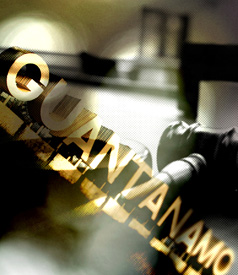Honest, paywall-free news is rare. Please support our boldly independent journalism with a donation of any size.
Terror suspect and former Guantanamo detainee Ahmed Ghailani was convicted on November 17 for conspiring to blow up buildings during the 1998 bombings of the American embassies in Tanzania and Kenya. Following five years of detention at Guantanamo Bay after his capture in 2004, Ghailani is the first former Guantanamo detainee to be tried in federal court. He was acquitted of all but one of the initial 285 charges against him and faces a possible life sentence.
But the trial, which took place in a New York federal district court, also served to relaunch a debate on the effectiveness of military commissions.
Rep. Peter King (R-Long Island), the incoming chairman of the House Homeland Security Committee, called the verdict a “total miscarriage of justice,” while Senate Minority Leader Mitch McConnell (R-Kentucky) said that terror suspects should either be tried in a military commission or never given a day in court. The president should ensure that “terrorists will be tried from now on in the military commission system that was established for this very purpose at the secure Guantanamo Bay, or detained indefinitely, if they cannot be tried without jeopardizing national security,” McConnell said.
Meanwhile, advocates of federal trials have pointed to the number of terror suspects to be tried in civilian court since 9/11, totaling more than 400 today, while military commissions have made five convictions overall in the same time span. Three were plea deals, including that of former child soldier Omar Khadr.
Human Rights First Law and Security Program senior associate Daphne Eviatar said, “The military commissions remain rife with constitutional defects. Federal courts have far more legal tools to prosecute terror suspects.”
In particular, Eviatar said, civilian trials move at a much swifter pace than military commissions because federal procedures are much more clear. “In a military commission, no one seems to know what the law is,” Eviatar said. “A lot of time gets wasted trying to figure out what to do. If you don’t know what the law is, it’s very hard to have a fair trial.”
A pivotal moment during the trial came when Judge Lewis Kaplan ruled that testimony from key witness Hussein Abebe was inadmissible, as he was present during an interrogation when Ghailani claims he was tortured. Opponents of federal trials have insisted that the evidence would have been admitted in a military commission, leading to a tougher sentence for Ghailani, but Kaplan pointed to US military code regulations which ensure that “No statement obtained by the use of torture or by cruel, inhumane or degrading treatment … shall be admissible.”
“It is very far from clear that Abebe’s testimony would be admissible if Ghailani were being tried by military commission, even without regard to the question whether the Fifth Amendment would invalidate any more forgiving provisions of the rules of evidence otherwise applicable in such a proceeding,” Kaplan wrote.
Critics and supporters were also split on potential safety measures necessary for a terror trial. But predictions for security problems during the trial, as alluded to by McConnell in his statement to the Senate and in previous months by former New York City Mayor Rudy Giuliani and former federal prosecutor Andrew C. McCarthy, proved to be empty. The city did not close down any streets for Ghailani’s trial or request any financial help from the government for extra security, and there were no disruptions or threats throughout the 57-day trial.
Eviatar said that the safety and speed of federal courts should give the government clarity in the midst of a political battle. “To say these guys should be in a military commission makes it sound tougher, but the federal court has a much stronger track record,” Eviatar said. “If we keep not giving justice to people or not giving them fair trials, we’re undermining our brand.”
The conviction is also important in light of the Obama administration’s controversial handling of terror suspect Khalid Sheik Mohammed’s case, Eviatar said. Mohammed is currently in detention indefinitely at Guantanamo and has not been scheduled for a trial either by military commission or federal court. “The failure to bring to justice some of the most heinous criminals in US history is a disservice to this country,” Eviatar said.
“The Obama administration should act now to prosecute other terror suspects who remain at Guantanamo in federal court – a system that has proven much more successful and adept than commissions.”
A terrifying moment. We appeal for your support.
In the last weeks, we have witnessed an authoritarian assault on communities in Minnesota and across the nation.
The need for truthful, grassroots reporting is urgent at this cataclysmic historical moment. Yet, Trump-aligned billionaires and other allies have taken over many legacy media outlets — the culmination of a decades-long campaign to place control of the narrative into the hands of the political right.
We refuse to let Trump’s blatant propaganda machine go unchecked. Untethered to corporate ownership or advertisers, Truthout remains fearless in our reporting and our determination to use journalism as a tool for justice.
But we need your help just to fund our basic expenses. Over 80 percent of Truthout’s funding comes from small individual donations from our community of readers, and over a third of our total budget is supported by recurring monthly donors.
Truthout has launched a fundraiser, and we have a goal to add 273 new monthly donors in the next 72 hours. Whether you can make a small monthly donation or a larger one-time gift, Truthout only works with your support.
